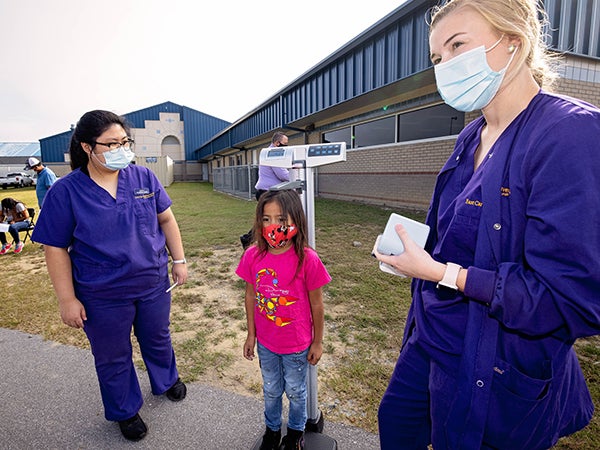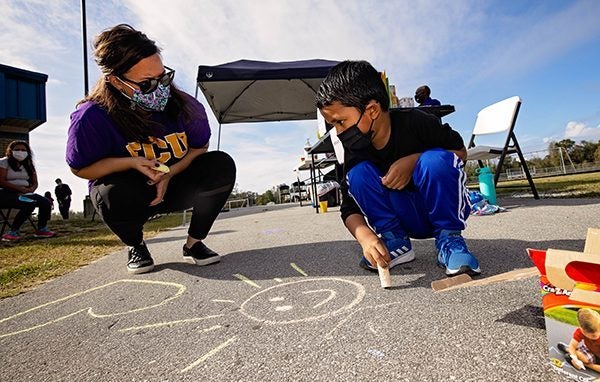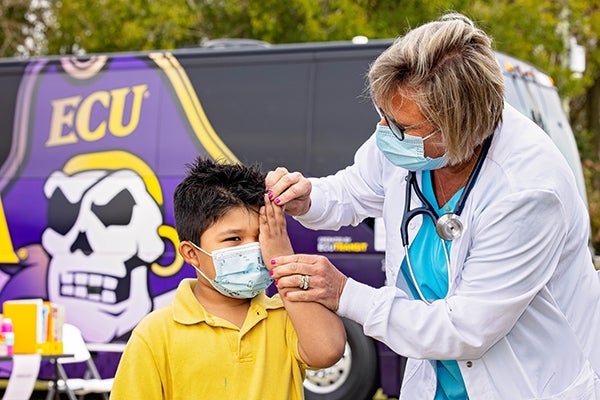MOBILE HEALTH SCREENINGS
ECU providers offer health screenings to ENC schoolchildren via mobile unit
An ECU Brody School of Medicine-led initiative that provides telehealth screenings to eastern North Carolina children has enlisted a creative way to bring health care to the students during the COVID-19 pandemic.
Since September, ECU’s Healthier Lives at School and Beyond School-Based Telemedicine Program has used an ECU Transit bus to visit schools in Duplin County to connect students and staff with quality behavioral health, nutrition, dental and acute medical care services. The mobile unit has been used to provide screenings for close to 100 students so far, with additional visits planned.
The program, created in 2016 through a $1.2 million grant from the Health Resources and Services Administration (HRSA), initially screened students using telemedicine—secure video connections between the schools and health care providers. Because many schools shifted to virtual learning, the Healthier Lives program made a transition as well by using the mobile unit.
“This is in direct response to COVID. We were having a lot of difficulty getting in contact and in reach with the children, so the mobile unit is in response to that difficulty,” said Jill Jennings, ECU’s project coordinator for the program. “We’re going a hybrid route, a bus going in person to them, making it easier for us to then communicate with the parents in person and then be able to hopefully generate nutrition referrals, behavior health referrals and oral health referrals by providing these physicals.”
Healthy lives through technology and transit
The Healthier Lives at School and Beyond program is the first school-based telemedicine program of its kind in the region, according to Jennings, and is a collaboration between ECU, Duplin County Schools, the Center for Rural Health Innovation, the Duplin County Health Department and Goshen Medical Center.

Nursing students Rachel P. and Kailey Howard weigh Emily Huerta during her exam. They were at B.F. Grady Elementary School in Duplin County as part of the Healthier Lives at School and Beyond program.
The first four years of the grant were funded by HRSA; funding now comes primarily from the Anonymous Trust, a private North Carolina foundation.
ECU Transit also stepped in this fall to help solve the problem of provider access to students.
“We were very appreciative of the ECU Transit people we talked to; they agreed to take a fancy bus that the football and basketball players ride on, took out rows of seats and created a mobile medical van out of an ECU Transit bus,” said Dr. Doyle “Skip” Cummings, the program’s principal investigator. “We loaded on our staff and we’ve been going from school to school in Duplin County, and soon hope to be doing that in Jones County come January.”
A verbal agreement with the superintendent of Jones County Schools signals new growth for the program and more students reached there, pending a final agreement.
Since its inception, the Healthier Lives at School and Beyond has done close to 1,000 screenings and opened doors to access for students in need of specialized care and resources in their community. The mobile van is a way to continue care and ease the burden of continuing services for other community providers.
“Students are required to have school physicals, sports physicals, immunizations. There’s no getting around those laws,” Cummings said. “Yet the infrastructure in Duplin County right now is literally overwhelmed. So, we had to think about some creative strategies pretty fast to come alongside them and what they’re already doing to meet this tremendous demand.”
Meeting patients where they are
The Healthier Lives at School and Beyond program has experienced substantial and consistent growth since its beginning, Jennings said. When the program began seeing patients during its second year, providers completed 88 visits. Year three saw 320 visits completed, and year four was capped by 685 visits.
The program’s ability to dodge obstacles and adapt to unforeseen circumstances has contributed to its overall success, first contending with Hurricane Florence and then the coronavirus pandemic—both of which led to school closures.
“In year four, we piloted an oral health screening in one school in collaboration with a state dental hygienist and our Healthier Lives dental coordinator,” Jennings said.
From that, 767 students were screened, 62 of whom were referred for follow-up care. Images were reviewed by ECU School of Dental Medicine faculty, and referrals and/or recommendations were made to local dental providers as well as to dietitians. The College of Nursing and the College of Allied Health Sciences have also provided expertise during screenings, through nursing students and a dietetic intern.
The first mobile unit screening trip was in September, with six subsequent visits through the end of October. Nearly half of those screened in that time did not have a primary care provider, and nearly 30% were uninsured. Some students were referred for nutrition or behavioral health services to be delivered via telehealth.
“These are students we otherwise would have had great difficulty reaching given the current circumstances surrounding the pandemic,” Jennings said.

Dietician Julia Johnstone helps entertain Sebastian Campozano before his exam at B.F. Grady Elementary School in Duplin County as part of a team helping provide school physicals.
The interactions between students and providers by telehealth visits and the in-person mobile unit screenings have established a level of trust that translates into a higher quality of life for students.
“We’ve been able to establish a trusted presence within the Duplin County school system and provide a variety of health care services to hundreds of students, staff and faculty,” Jennings said. “Thanks to four years of generous funding from HRSA and now from Anonymous Trust, we can continue our work in Duplin County as well as expand into Jones County. We’ve received inquiries from additional school districts across rural eastern North Carolina looking for potential collaboration with ECU and our telehealth team. That is indeed gratifying.”
Julia Johnstone serves as the lead dietitian for the program and provides nutrition education and counseling to schoolchildren. She helps the students understand nutritional choices, the benefits of exercise and the amount of sugar in food and drinks.
“We are able to meet the students where they are, either in the school setting or at home during their virtual school week, by utilizing telemedicine,” Johnstone said. “Many students and their families are unable to travel to meet with a registered dietitian; this program allows these students to become educated on healthy eating habits without the hassle of missing school and traveling to an appointment.”
Dr. Kristina Simeonsson, associate professor in pediatrics and public health in the Brody School of Medicine, pediatrician consultant on the project, said the program’s growth increases its potential to address chronic health problems like childhood asthma and cavities. Its set-up allows for the growth that could benefit more students over time.
“The Healthier Lives program has provided much needed services to children of rural eastern North Carolina with limited access to health care,” Simeonsson said. “The accessibility to a dietitian and a behavioral health specialist to kids that would otherwise have to drive over an hour to be seen is remarkable.
“It gives primary care providers a network of support and resources to treat kids with urgent health care needs such as obesity, Type 2 diabetes, hypertension, anxiety, depression and other behavioral concerns.”
Set up for success
On a warm October day, children at B.F. Grady Elementary School in Duplin County awaited their health screenings in a different type of waiting room.
While waiting for their turn to climb onto the big purple and black bus, children busied themselves creating colorful pictures with sidewalk chalk. Others called to each other spurred impromptu games of chase as laughter pierced the air. Small groups of students thumbed through storybooks. Nearby, parents signed the necessary forms and discussed their child’s care with providers.

Nestor Yanez-Coria starts an eye exam with the help of Lead School Nurse Sue Ellen Cottle at B.F. Grady Elementary School as part of the Healthier Lives at School and Beyond program.
The breezy atmosphere put the children at ease—cutting the apprehension that can often come along on a visit to a doctor’s office.
Sue Ellen Cottle, lead nurse for Duplin County Schools, said the screenings and mobile unit have provided benefits across the board to everyone involved.
“It has allowed our students to stay in school and our parents to continue to be present at their jobs,” she said. “I have been on site at each school when the mobile unit has been there and have seen the interaction between ECU providers and our students. It is amazing to watch the behavioral specialist entertain the students with books, sidewalk chalk, and a loving atmosphere for them to not be afraid of prior to getting their health assessment completed.”
Parent Kendrah Keith of Wallace attended one of the mobile van’s recent visits to B.F. Grady Elementary School and said the atmosphere of the screenings encouraged the students to have fun while waiting for health care.
“We don’t have to make the kids sit too still and too quiet,” she said. “It gives them a little chance to release some of their energy while we wait.”
She said the mobile unit is a way that ECU reaches beyond its campus to meet the health care needs of rural children.
“It shows that they’re compassionate, they’re watching, they see the need,” Keith said, “and they’re trying to meet the needs of the communities.”
